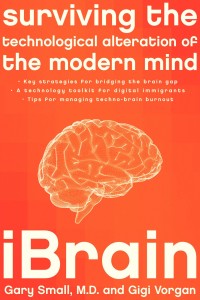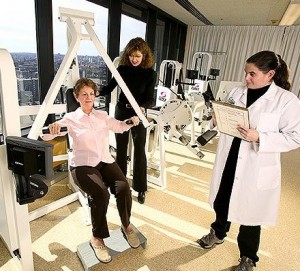Brain Training Lowers Car Crashes by 50%
 Systematic brain training using software to improve your cognitive performance is a relatively new technique. The software acts like a brain gym working your memory, visual cognition, speed of processing, numeracy, decision-making skills and the like to make them bigger and stronger. More than 10 vendors will sell you a package and program ranging in price from $20 to hundreds. We have covered most of them here on the Next Brain Blog.
Systematic brain training using software to improve your cognitive performance is a relatively new technique. The software acts like a brain gym working your memory, visual cognition, speed of processing, numeracy, decision-making skills and the like to make them bigger and stronger. More than 10 vendors will sell you a package and program ranging in price from $20 to hundreds. We have covered most of them here on the Next Brain Blog.
But does it work? And does it work better than solving crossword puzzles, playing video games or other mentally stimulating things we do for fun? There is compelling evidence that brain training software has impact it is just not clear how much.
So I am always on the lookout for new studies that look at the effectiveness of brain training software. For example, Posit Science recently publish a synopsis of two studies done in 2010. Note Posit Science sells brain training software but the studies were conducted by academic researchers in neuroscience and psychology. These are interesting because both studies show improvement in cognitive performance on tasks outside the training software. One even demonstrated a 50% reduction in at-fault car crashes over a six year period:
“This study looked at crash records for 908 older drivers who trained on a version of Posit Science’s Road Tour exercise six years earlier. Road Tour expands “useful field of view,” how much a person can take in with a single glance. Useful field of view is critical to safe driving: a wider field can help drivers spot dangers in their peripheral vision in time to react. The study authors found that training with the Road Tour technology (called “speed-of-processing training” in the study) cut a driver’s crash risk. In fact, they were responsible for about 50% fewer crashes than their untrained peers. Road Tour is available as part of both the InSight and DriveSharp brain fitness programs.”
This is an important result. It shows that brain training software can improve the cognitive performance of older adults enough to impact an important daily activity.
Interested to hear from readers that use brain training software. How does it improve your cognitive performance in daily life?
Categories: Decision Making, Older Adult, Perception, Software, Training Tags: brain training
Action Video Games Work Mental Muscles Big Time
 Multiple experiments done by Daphne Bavelier, professor of brain and cognitive sciences and her group at the University of Rochester, strongly suggest that action video games improve perception (speed and accuracy), attention (including multi-tasking), decision-making and other aspects of cognition.
Multiple experiments done by Daphne Bavelier, professor of brain and cognitive sciences and her group at the University of Rochester, strongly suggest that action video games improve perception (speed and accuracy), attention (including multi-tasking), decision-making and other aspects of cognition.
That is an amazing workout for the brain especially if you are getting it by having fun. The key is to play a game that is first-person and includes a lots of action or visual-motor coordination. My favorites are Geometry Wars and Soul Caliber 4.
Interested to hear from readers that play action video games. Which games do your play? Can you feel them working your mental muscles?
Categories: Decision Making, Memory and Learning, Mental Focus, Perception, Software Tags: brain training, games
Putting Science into the Art of Brainstorming
 I get email from readers asking about how to run brainstorming sessions. These are group meetings that are designed to come up with creative new ideas on hard problems. Many times such meeting can be a disappointment. The questions is – what specific practices can we use to improve group cognitive performance during brainstorming? Just the stuff we want to discuss on the Next Brain Blog.
I get email from readers asking about how to run brainstorming sessions. These are group meetings that are designed to come up with creative new ideas on hard problems. Many times such meeting can be a disappointment. The questions is – what specific practices can we use to improve group cognitive performance during brainstorming? Just the stuff we want to discuss on the Next Brain Blog.
North Carolina University just released a comprehensive study that Finds Brainstorming Rules Can Lead to Real-World Success in Business Settings.
“The study found that there are 21 specific best practices that contributed to successful brainstorming efforts, and that the benefits of high quality brainstorming could be attained when at least 10 to 11 of those practices are put into place – such as the inclusion of subject-matter specialists and an openness to input from all team members.”
This is one of the few empirical studies I have found that shows the quality of brainstorming can impact group decision-making. You can find the details in a free draft version of the paper. They quote a lot of interesting research some of which flies in the face of normal practice. For example:
“More importantly, contemporary experimental research by Lynch et al. 2009 and Hunton and Gold 2010 find that the brainstorming methods that are predominant in practice e.g., face-to-face communication and open brainstorming are less effective than alternative methods e.g., electronic communication and round robin brainstorming.”
Categories: Decision Making, Problem Solving, Training Tags:
A Philosophical Method For Next Level Thinking
On the Next Brain blog we explore specific techniques for improving brain function and cognitive performance. We report on techniques from any field where excellence in thinking, learning, perception, memory, creativity, decision-making and other mental functions are known to take place. For example, consider the field of philosophy. Philosophers are known for their ability to think deeply and clearly about the most complex topics. What can we learn from them to enhance our cognitive performance?
One technique that you can pick up fairly quickly and use nearly every day is call the Toulmin Method. This is a method for analyzing text or verbal statements and abstracting any argument that is being made. Making the claim, reasons and justification for an argument clear is a key step in being able to think analytically about a topic rather than just going with our gut instinct.
Colorado State University has developed an excellent guide to The Toulmin Method. In short and simple language it breaks down the parts to an argument, explains how to see them in everyday circumstances and even provides a worksheet to apply the method.
It should take no more than 45 minutes to work through the site including the student example. You can pick a newspaper story, blog post, memo from work or passage from a book you are reading and try and apply it. Keep using it and you will see how the depth and intellectual clarity you have around key issues and arguments improves. You might even find yourself changing your mind on important matters!
Interested to hear from readers that use the Toulmin Method or any other technique for making arguments explicit and analyzing them.
Categories: Decision Making, Problem Solving, Training Tags: critical thinking
Make Scene Analysis Decisions up to 25% Faster
 On the Next Brain blog we explore specific techniques for improving brain function and cognitive performance. The best techniques are easy or pleasurable, have a significant impact and are backed by scientific evidence. Take for example, the new study on how video games impact the brain’s ability to process probabilistic information conducted at the University of Rochester.
On the Next Brain blog we explore specific techniques for improving brain function and cognitive performance. The best techniques are easy or pleasurable, have a significant impact and are backed by scientific evidence. Take for example, the new study on how video games impact the brain’s ability to process probabilistic information conducted at the University of Rochester.
Researchers found that playing action video games for as little as 50 hours increased decision speed up to 25% with no loss in accuracy.
The tasks involved analyzing a scene (sometimes shown visually other times just described verbally) and deciding what is going on. Subjects were 18-25 years old and do not normally play video games.
Why does this work? According to the researchers:
“Decisions are never black and white,” she said. “The brain is always computing probabilities. As you drive, for instance, you may see a movement on your right, estimate whether you are on a collision course, and based on that probability make a binary decision: brake or don’t brake.”
Action video game players’ brains are more efficient collectors of visual and auditory information, and therefore arrive at the necessary threshold of information they need to make a decision much faster than non gamers, the researchers found.
This suggest using action video games to train your brain should create lasting and transferable effects.
Categories: College Student, Decision Making Tags: games
Phosphatidylserine Improves Thinking in 10 Days
 Phosphatidylserine is a supplement that some claim can stave off cognitive decline in the elderly and boost memory, learning, mood and decision-making in people of all ages. I have seen conflicting studies so I am always on the look out for new ones that are done with great scientific rigor and that might help settle the issue.
Phosphatidylserine is a supplement that some claim can stave off cognitive decline in the elderly and boost memory, learning, mood and decision-making in people of all ages. I have seen conflicting studies so I am always on the look out for new ones that are done with great scientific rigor and that might help settle the issue.
Found one recently that was presented at the 7th Annual International Society of Sports Nutrition Conference. It was a small study but it was double blinded and placebo controlled. You can read about it in, Study Shows PS Use Improves Cognition Prior To Exercise.
Here is the key finding:
“Cognitive performance was measured by the serial subtraction test (SST), a validated method in which subjects repeatedly subtract from 1,579 by intervals of seven. PS supplementation did reduce the time needed for a correct calculation by 21%, reduced the total amount of errors by 38% and increased the amount of correct calculations per error by 42% prior to exercise.”
To achieve this effect athletes took 400 mg a day for 10 days. I don’t think “safe and effective” dose guidelines have been established I have seen other studies and recommendations that use between 300-500mg daily.
I am not advocating the use of this supplement. I am however, interested in hearing from readers that use it. What dose, how long and what kind of benefits or side effects are you experiencing?
Categories: Cognitive Decline, Decision Making, Diet, Manage Emotions, Memory and Learning Tags: smart drugs
A Store Just for Your Brain
 Marbles is a store just for your brain. They have four locations in Illinois and are looking to expand. Fortunately, their products are available online.
Marbles is a store just for your brain. They have four locations in Illinois and are looking to expand. Fortunately, their products are available online.
They offer an overview of brain fitness, a free self assessment and products to improve memory, critical thinking, coordination, word skills and visual perception. They provide books, brain software, toys and novelty items from many different vendors. Marbles takes the time to make gift bundles for the Wordsmith, Trickster, Creative Genius, Brainetics (whatever that is) and others. They offer some free Brain Coaching and sponsor a number of interesting events.
Marbles could well be a superstore for anyone looking to improve brain function and cognitive performance. They will be the subject of regular posts on the Next Brain Blog. I am interested to hear from readers that have visited one of the store locations.
Categories: Books, Cognitive Decline, Decision Making, Memory and Learning, Perception, Software, Training Tags: brain training, cognitive fitness
Can You Use the Internet and Mobile Phones to Rewire Your Brain?
 Email, search engines, social networking sites, text messaging, blogging, twitter, web-based phones, GPS, playing/making music/videos, taking and instantly sharing pictures and a slew of other technological capabilities have become widely available thanks to the internet, mobile phones and other hand-held gadgets. These new ways of creating, finding, sharing and using information are so powerful and pervasive that they are transforming how we learn, make-decisions, collaborate creatively and do many other brain-intense activities.
Email, search engines, social networking sites, text messaging, blogging, twitter, web-based phones, GPS, playing/making music/videos, taking and instantly sharing pictures and a slew of other technological capabilities have become widely available thanks to the internet, mobile phones and other hand-held gadgets. These new ways of creating, finding, sharing and using information are so powerful and pervasive that they are transforming how we learn, make-decisions, collaborate creatively and do many other brain-intense activities.
Some argue that they make us smarter or dumber. For example, the Atlantic Magazine article, Is Google Making Us Stupid? triggered a firestorm of discussion. Fortunately, the answer is no. Google and using search engines actually makes us smarter! Others take the point further and argue that the collective effect of all these technologies is driving a rewiring of our brains on a basic level. For a good introduction to this type of argument check out the book, Surviving the Technological Alteration of the Modern Mind.
The book’s theme is controversial but the authors do a great job outlining the specific technologies and their likely impact on boosting or dowsing cognitive performance. This is just the kind of information we will be covering in the Next Brain Blog. I will look at each claim and recommendation in later posts.
In the meantime, I am interested to hear reader stories on how the internet or mobile computing is being used to improve cognitive performance and build a better and longer-lasting brain.
Categories: Books, Decision Making, IQ and EQ, Memory and Learning, Perception, Software Tags: creativity
Avoid Falling into These Common Decision Traps
Life is made up of a handful of critical decisions, hundreds of important decisions and literally thousands of minor decisions. Taking the time to develop good decision-making skills is well worth the investment. We will cover the topic regularly in the Next Brain Blog.
One proven way to enhance your decision-making skill is to actively manage the traps (also known as cognitive biases) that we can fall into. The Hidden Traps in Decision Making is an easy-to-read primer filled with practical advice. The traps or cognitive biases it covers include, for example:
- ANCHORING: Overemphasizing the first information you recieve
- STATUS QUO: Selecting alternatives that best fit what you are currently doing
- SUNK COST: Making decisions that support past decisions
- CONFIRMING EVIDENCE: Seeking and accepting information that supports your current or preferred point of view.
 We all have these tendencies. They cannot be eliminated, they are part of how our brain works. We have them because they provide strong advantages in certain circumstances. The key is to be aware of them and take simple steps to make sure they don’t trap us into making poor decisions. For example, one way to avoid the confirming evidence trap is to be sure you always find an equal amount of evidence for and against your prevailing point of view. Or ask another to scout the opposing evidence that you might be biased against seeing as relevant.
We all have these tendencies. They cannot be eliminated, they are part of how our brain works. We have them because they provide strong advantages in certain circumstances. The key is to be aware of them and take simple steps to make sure they don’t trap us into making poor decisions. For example, one way to avoid the confirming evidence trap is to be sure you always find an equal amount of evidence for and against your prevailing point of view. Or ask another to scout the opposing evidence that you might be biased against seeing as relevant.
Turns out we are loaded with dozens of biases that impact how we learn, perceive the world, make decisions, socially interact and perform other cognition-intense tasks. There will be a lot to blog about. Look forward to comments on how you have learned to manage decision-making or other types of cognitive biases.
Categories: Decision Making, Training Tags: cognitive bias
Resistance Training Once per Week Improves Mental Functioning by 10+%
In the Next Brain Blog we track down and report on a full-range of ways to improve the function and longevity of your brain and mind. There are many studies that prove physical exercise is good for your brain fitness and mental health.
But what type should you do, what specifically does it improve and how long do the effects last? A new piece of research reported in the Archives of Internal Medicine on Resistance Training and Executive Function gives some specific answers.
 They found that for older female adults resistance training (dumbbells and weight machines) one or twice a week for a year improved their abilities to plan, make decisions, focus and resolve conflicts by more that 10%. These mental tasks all belong to what is called your executive function.
They found that for older female adults resistance training (dumbbells and weight machines) one or twice a week for a year improved their abilities to plan, make decisions, focus and resolve conflicts by more that 10%. These mental tasks all belong to what is called your executive function.
This is an impressive finding because it gives specifics on the type of exercise and the impact it will have. More to the point:
You can get a big boost in mental performance from a modest weekly investment in resistance training.
You don’t need to go to the gym or use fancy weight machines – low cost home exercise equipment will do the trick.
By the way, you can measure the efficiency of your executive function using the Stroop Test. I will blog on that later in the month.
Source: Image
Categories: Cognitive Decline, Decision Making, Lifestyle, Mental Focus, Older Adult, Training Tags: exercise, Stroop Test

